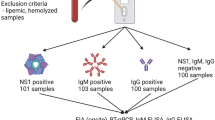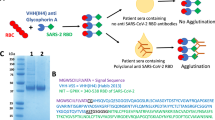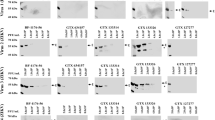Abstract
THE agar-gel precipitin technique has been used to differentiate members of the tick-borne encephalitis virus complex of group B arboviruses1. This report describes the application of this technique in the rapid typing of dengue virus types 1, 2, 3 and 4.
This is a preview of subscription content, access via your institution
Access options
Subscribe to this journal
Receive 51 print issues and online access
$199.00 per year
only $3.90 per issue
Buy this article
- Purchase on Springer Link
- Instant access to full article PDF
Prices may be subject to local taxes which are calculated during checkout
Similar content being viewed by others
References
Clarke, D. H., in Symposium on Biology of Virus of the Tick-borne Encephalitis Complex, edit. by Libikova, H., 67 (Czechoslovak Academy of Science, Prague, 1962).
Lim, K. A., Chan, Y. C., Phoon, W. O., and Hanam, E., Bull Wld. Hlth. Org., 30, 227 (1964).
Author information
Authors and Affiliations
Rights and permissions
About this article
Cite this article
CHAN, Y. Rapid Typing of Dengue Viruses by the Micro-precipitin Agar-gel Diffusion Technique. Nature 206, 116–117 (1965). https://doi.org/10.1038/206116a0
Issue Date:
DOI: https://doi.org/10.1038/206116a0
Comments
By submitting a comment you agree to abide by our Terms and Community Guidelines. If you find something abusive or that does not comply with our terms or guidelines please flag it as inappropriate.



